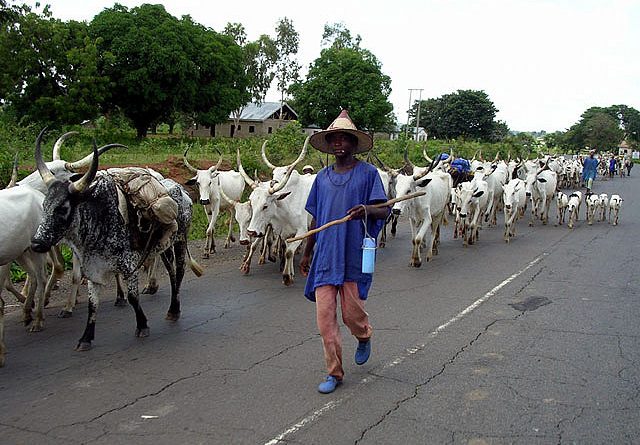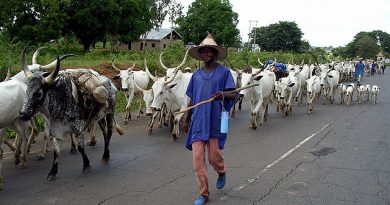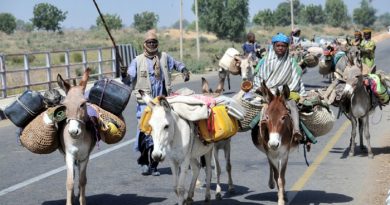How Activities Of Herdsmen Threaten Ghana’s Food Security
These are trying times in Ghana. Commodity prices are falling and the country’s last resort, which is the agriculture sector, is being threatened by the activities of Fulani herdsmen who migrate into the country from the Sahel region of West Africa.
The herdsmen who seasonally bring down their cattle from Burkina, Mali and other parts of that region for pastures penetrate Ghana through the Northern, Upper East, and Upper West regions to the southern part of Ghana particularly, the Ashanti and Brong Ahafo, Eastern and Western regions.
Activities
These herdsmen, believed to come from the Fulani ethnic group, and their large numbers of cattle engage in nefarious activities such as the destruction of farm crops, arable land, pollution of water bodies, killing and maiming of farmers who dare to stand against their capricious activities, raping of females in the communities, infectious disease among others.
Contributing recently to a Ghana Television (GTV) discussion on the topic: ‘Promulgation of a Cattle Ranching Law’, Mohammed Adam Nashiru, Member of the Peasant Farmers Association of Ghana, stressed that “Our farmers are being destroyed by these cattle herdsmen with impunity”.
The TV programme dubbed: “Business Advocate” on the national television was organised by BUSAC Fund in collaboration with Ghana Journalists Association (GJA) and supported by DANIDA, United States Agency for International Development (USAID) and the European Union (EU).
He added that the over 35,000-member countrywide association had received several reports of farmers being killed from the length and breadth of the country by these herdsmen.
“In some case, females of these farming communities are being raped by the herdsmen”, Mr Nashiru said.
He further stated that; “we have also received reports on the confrontations between farmers and cattle herdsmen which at times lead to people losing their lives in several parts of the country”.
On his part, Imam Hanafi Sonde, the Chairman of Ghana National Association of Cattle Farmers described the activities as unfortunate.
He admitted that some of the herdsmen are also confronted with disease and other personal issues including cattle death, emphasising: “For instance, recently some of our cattle herdsmen are battling with diseases”.
Dr Anthony Nsoh Akunzule, a Deputy Director of Veterinary Services at the Ministry of Food and Agriculture (MoFA) collaborated that one of the effects of the free movement of cattle is the increase in trans-boundary diseases on the animals and passes on to the consumers, affecting the health conditions of the citizenry.
Threats to Food Security
All activities listed above have tremendous effect on food security. 10 per cent of Ghana’s national budget supposed to go into agric sector financing. So, after spending these colossal amounts of money into the sector and fail to address the herdsmen menace our investments will be wasted, Mr. Nashiru lamented.
He stated: “Farmers will not get land to farm and our arable land will also be destroyed. This will eventually lead to poverty, hunger, malnutrition, and diseases”.
William Agyapong Quaittoo, a Ranking Member of Agriculture and Cocoa Affairs of Ghana’s Parliament observed that the volume of food imports to Ghana including meat keeps increasing.
This means that we are creating jobs for youth in other parts of the world, he sadly stated.
Economists argued that the huge consumption of foreign goods put the Ghana Cedi (Ghana currency) under constant pressure. As of the time of going to press, the Cedi traded at 3.96 against the US currency.
This year, it has depreciated 26 per cent in value against the Dollar. On a year-to-date basis, the Ghana currency has depreciated by 15.5 per cent as of October 2015, compared with 31.2 percent in the corresponding period of 2014, according to the Bank of Ghana (BoG).
Ghana currently consumes more foreign goods than local products. According to data from the Ministry of Trade and Industry, in 2013 alone, the country spent a whopping $1.5 billion in foreign currency on the import of rice, sugar, wheat, tomato products, frozen fish, poultry and vegetable cooking oils, most of which can be produced locally.
Threats to National Security
Recently security men and women were deployed to Asante Akyem in the Ashanti Region of Ghana to flush out nomadic Fulani herdsmen following increased tension between residents of the area and the herdsmen.
The deployment by the Ashanti Regional Security Council (REGSEC) was to prevent the already tense relationship between the residents and the herdsmen from escalating into violence.
Two indigenes had been reportedly killed on their farms in that area while some were killed by the Fulanis in other parts of the country.
Tension had also resulted in the movement of some Fulani herdsmen from Agogo in the Ashanti Region to Begoro in the Fanteakwa District in the Eastern Region following threats by the youth of the area that the nomads should leave.
Addressing the Challenges
After several interventions from Operation Cow Leg to registration of cattle, the menace is yet to be surmounted in the country.
To this end, the stakeholders including members of the Peasant Farmers Association of Ghana, Ghana National Association of Cattle Farmers, MoFA and Parliament are in discussions to formulate the Cattle Ranching Law after several decades.
According to them, the law when passed by Parliament will regulate the movement of animals especially cattle in the country. The law noted will also stop the herdsmen from engaging in the above-mentioned activities.
Mr Nashiru therefore called on Ghana to learn international best practices from neighbouring Burkina Faso and Mali, which had passed the Cattle Ranching Laws to protect farmers and properties in their countries.
Dr Akunzule maintained that Ghana needs to pass the law on cattle ranching since the farming system in the country is the mixed crop type.
Mr Quaittoo also backed the idea in facilitating the law to safeguard the country’s animal and crop production.
Mr Sonde who described the initiative as laudable one said their outfit was prepared to support in any direction to ensure that the law was passed and ensure peace and security in the country,
Ghana’s economy which is expected to growth 4.1 per cent this year after deceleration growth of 3.5 per cent engages about 60 percent of its people in the agric sector.
However, figures from Ghana Statistical Service (GSS) indicated the country’s agric sector recorded 0.04 per cent growth in 2015 as against 8.5 per cent of 2014.
Industry sector recorded the highest growth of 15.6 per cent the services sector followed with 4.7 per cent and agriculture sector in 2015.
On his part, a renowned Chartered Economist and Senior Lecturer of the University of Cape Coast (UCC), Dr. John Gatsi has proposed to the government to develop a policy to attract at least 40% of the country’s middle-class to engage in backyard farming.
According to him, the policy when implemented would go along to revamp the country’s agric sector.
Dr. Gatsi explained what has accounted for the agric sector’s abysmal performance, saying the 0.04 per cent growth means the agric output contribution to GDP does not perform well.
This may be due to many factors which will include the introduction of new activities into the basket of items that contribute to the GDP, he added.
Besides, the poor showing of the agric sector may also due to dwindling donor support to the sector, delay in releasing donor support to the agric sector, late arrival of agric equipment, among other factors.
“It also implies while services and natural resources sectors continue to perform very well, there is the need to redefine the areas in agric that need special and immediate attention.
Also there is the need to consciously direct the benefit of the services sector to the agric sector”.
For instance, there is the need to revamp interest of private capital to agric financing as well as directing simple and modern ICT technologies to agric, Dr Gatsi indicated.
When asked does the 0.04 per cent growth mean that our agric sector is in disarray? The senior Finance lecturer of the UCC answered: “It means that when you compare the agric output to other sectors that is the effect on GDP. But it does not mean that production is not taking place in the country”.
It also means that some negative development took place within the period. For instance, distribution of fertilizers to farmers, poor rainfall pattern, and general difficulties in accessing funds were pronounced during the period, Dr. Gatsi further explained.
For the country to get out of the 0.04 per cent, he advised: “We should improve on the agric financing, improve on technical support to farmers, improve on road infrastructure in farming communities, and provision of irrigation facilities”.
Dr. Gatsi was quick to add that there should be a general policy to aggressively attract private investment in agric because with appropriate technology and investment 15% of those who invest in agric can produce three times the current production of all farmers in the country.
Agric needs huge financial investment and deployment of effective technology, so government should focus on creating the enabling environment to attract private investment to agric, he stated.





